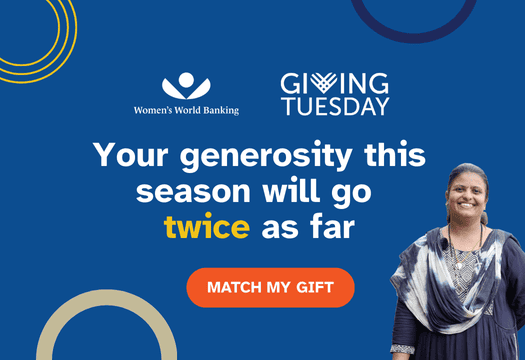To celebrate Women’s World Banking’s 45th anniversary, we are showcasing the voices of individuals from around the world who have shaped and touched Women’s World Banking journey since its inception in 1979 at Commission on the Status of Women to today!
These are stories from across Women’s World Banking’s reach from the women we serve and our customers, to allies and women in leadership who have contributed to women’s economic empowerment and financial inclusion.
Meet Rajesh Bansal. He is CEO of the Reserve Bank Innovation Hub (RBIH) and has been at the forefront of efforts to promote women’s financial inclusion in India. His mission goes beyond merely providing access to financial tools—it’s about ensuring that women can consistently use these services, receive high-quality support, and feel secure in their financial decisions, regardless of their background or financial literacy.
A Vision for Gender-Intentional Solutions
While working at RBIH, Rajesh realized that traditional financial products and services often failed to meet women’s specific needs, especially in rural areas. A new approach was needed—one that was gender-intentional. This realization led to the creation of the Swanari Program, a flagship initiative at RBIH designed to cater to the financial needs of women.
Rajesh and his team centered their efforts around three key pillars: Data, Design, and Demonstration. These pillars enabled them to tailor solutions to the realities of women’s lives. As Rajesh puts it, “We want to ensure that every woman, regardless of her socio-economic background, has access to the tools she needs to thrive financially.”
Insights into Women’s Financial Challenges
From the outset of the program, the RBIH team realized that developing effective financial solutions for women required more than repurposing existing products. “We couldn’t simply retrofit what was already available and expect it to work for women.” Quantitative and qualitative research became essential to understanding that financial inclusion must take into account the socio-economic and cultural factors influencing women’s financial decisions.
At the heart of this research was the Swanari Gender Data Observatory, which helped RBIH collect critical data on women’s financial behaviors. This data-driven approach enabled the team to shape financial products that address women’s unique challenges, from irregular income patterns to limited access to formal credit.
A Breakthrough Moment: Digital Innovation for Self-Help Groups
One of RBIH’s proudest accomplishments is the Digital Innovation for Self-Help Groups (SHGs) pilot project. Launched in partnership with Canara Bank, this initiative is transforming how SHGs access credit. Traditionally, SHGs relied on cash-based and paper-heavy processes, which made it difficult for women to secure credit on favorable terms. Rajesh saw the potential for digital innovation to change this by creating a seamless, end-to-end digital lending process.
Today, the project is live in 11 states, covering 605 branches, and has disbursed close to ₹45 crore (USD $120K). As Rajesh states, “What excites me most is the opportunity this project creates to build individual credit histories for millions of women who have never had that kind of financial footprint before. It’s about giving women the tools to move beyond informal credit systems and into the formal economy.”
Ongoing Barriers: What Still Needs to Be Addressed
Despite significant progress, Rajesh acknowledges that many hurdles remain. Women in small towns and smaller cities, as well as rural areas, continue to face challenges in accessing credit, savings products, and financial services that suit their needs.
“We’ve made great strides in access, but usage is still a challenge.” Many women open accounts but don’t use them regularly due to socio-economic barriers such as low financial literacy or a lack of trust in formal financial institutions.
Ongoing projects at RBIH aim to create solutions that address these barriers head-on. Rajesh’s focus is on developing frictionless finance solutions that meet women where they are—both in terms of location and financial capability. “Women need services that are flexible, accessible, and responsive to their realities. It’s about ensuring they have the tools to manage their money when, where, and how they need to.”
Shared Vision with Women’s World Banking
Global best practices have played a significant role in shaping the work at RBIH. One standout initiative is Women’s World Banking’s Jan Dhan Plus project, whose savings-led credit model aligns with RBIH’s focus on developing goal-based savings products for women, particularly in sectors like dairy farming. Expanding women’s participation in formal savings mechanisms is crucial, especially as India faces rising credit-to-deposit ratios and slower deposit growth.
“Women’s World Banking has shown that financial products designed specifically for women can have a profound impact, reinforcing our mission at RBIH to create services that directly address their needs.”
Looking Ahead: Building a More Inclusive Financial Ecosystem
Looking back on his journey, Rajesh remains deeply committed to creating an inclusive financial ecosystem for women. “We can’t achieve true economic growth without the full participation of women.” For him, financial inclusion is not only about gender equality but also about unlocking economic potential. India’s path to becoming a trillion-dollar economy depends on empowering half its population.
His message is clear: financial inclusion requires collective action. Governments, financial institutions, and civil society must work together to break down the barriers women face. “This isn’t something we can do alone. We need partnerships, we need advocacy, and we need investment in innovative, gender-intentional solutions.”
With the right focus and collaboration, Rajesh believes that India can lead the way in building a financial system that empowers every woman to thrive.
Women’s World Banking has changed the lives of millions of women, transforming their households, businesses and communities, and driving inclusive growth globally through financial inclusion.
Today, using our sophisticated market and consumer research, we turn insights into real action to design and advocate for policy engagement, digital financial solutions (see Blanca’s story here), workplace leadership programs, and gender lens investing.
Help us reach the nearly billion women still excluded from the formal financial system. Donate now.




